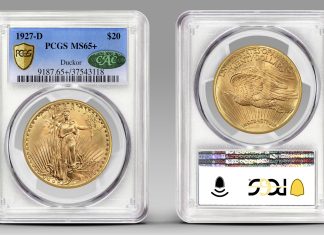 World (Fiscal) Cup: Portugal: 0 – Fitch’s: 1
World (Fiscal) Cup: Portugal: 0 – Fitch’s: 1
Good Day,
Once again, a sharply falling euro dragged bullion prices down under $1100.00, while the US dollar surged by a massive 0.85 on the trade-weighted index, reflecting the safe-haven bids that investors are placing upon it as the crisis in the Old World shows no signs of letting up.
Today’s downgrade of Portuguese government debt by Fitch’s rating agency is stark reminder that the region’s fiscal problems are clearly not confined just to Greece. Portugal is obviously being seen as yet another domino in the line-up of EU economies that face a long period of weak growth and recession as they slog through a protracted period of "adjustments."
The EU fiscal crisis in some of its peripheral economies is seen as continuing to maintain heavy downward pressure on the euro. Experts now envision the currency sinking to $1.28 or $1.20 sometime in Q2 of this year. The common currency lost about 1% just this morning, falling to a ten-month low against the greenback, after officials in France and Germany alluded to the fact that Greece’s aid package-whatever shape it eventually takes-will require assistance from the IMF. Commodities guru Jim Rogers opined that the euro will ‘break up’ at some point in the next 15 to 20 years, while UBS economist Paul Donovan tendered the view that — aid notwithstanding — Greece will eventually default.
Against this still turbulent background, gold and other commodities opened under renewed selling pressure this morning. In the hours leading up to the opening of the NY market, gold bullion lost nearly $10 to sink to a low of $1093.00 per ounce. The mid-week session opened with a $9.40 loss in the yellow metal — quoted at $1093.40 / oz. — as against an 81.65 reading on the US dollar index and a near-$1.50 drop in crude oil prices. The beleaguered euro was quoted at 1.334 against the US currency as of 8:10 this morning.
Technical analysis issued by FXStreet.com indicated this morning that gold may have completed a head & shoulder top at the $1145.80 level and is aiming towards the $1088.50 support zone – which, if it fails to hold, could usher in a retest of $1044.50 per ounce. Base metals were also off this morning, chalking up losses of between 0.60% (aluminium) and 2.42% (lead).
Silver dropped 31 cents on the open this morning, and was quoted at $16.68 per ounce. Meanwhile, platinum fell $25 to reach $1584.00 but palladium paced the complex with a 3%+ decline that brought it to the $451.00 level at the open. Rhodium was last seen as quoted at $2280.00 bid per troy ounce.
Public hearings to explore the possible need for trading position limits on metals will start in Washington tomorrow. The epic 2008 crude oil market free-for-all has given rise to calls for the imposition of curbs intended to temper speculation in various commodities. Bart Chilton, one of five CFTC commissioners, has been a vocal proponent for placing such limits into the markets-especially the ones relating to gold, sugar, coffee, and oil. The CFTC has had a hard time trying to get concentration out of the picture in the oil markets, and –according to Reuters- will have an even tougher time trying to impose limits in the metals niche.
We are thus left with the prospects of what Mr. Chilton himself has labelled as an "educational, informative" hearing tomorrow (i.e., far from proposed limits, "crackdowns" and such). Mr. Chilton might like a better-regulated metals niche but is running up against basic issues — some, of a semantic nature. For example, what is an "adequate" position limit? Has there been "manipulation" in these markets? Has pricing "functionality" been "harmed" and if so, how, by how much, and by whom? Sounds like the good old debate about what the meaning of the word "is" is. Good luck. Entertainment value might be provided by certain panellists debunking the alleged gold price suppression theories offered up by other panellists.
As well, there will never be a shortage of hyperbole from one quarter or another, any time legislation is contemplated to address this, or that. To wit, the…interesting characterization of the bank reform bill currently under consideration, as offered up by one, Senator Judd of New Hampshire. Marketwatch reports it as follows:
"A measure under consideration in sweeping bank reform legislation that allows government regulators to break up big banks if they want to is an attempt to nationalize large financial institutions, said Sen. Judd Gregg, R-N.H., on Wednesday. "That language is an attempt to nationalize the big banks because it says in the most aggressive way, it does not matter if you are profitable or effective, there will be a group of people here in Washington that can decide that you are too big and can break you up," Gregg said. Gregg is a member of the Senate Banking Committee, which is reviewing bank reform legislation."
Meanwhile, the US Commerce Department reported this morning that durable goods orders in the US rose for a third consecutive month in February, by 0.5%. The figure was mostly in-line with economists’ expectations and continues to underscore the extent to which manufacturing is driving the recovery in the US. That said, it would be nice to see the consumers (at the final sales level) pitching in and doing their part.
Right about now, many of them are apparently busy…packing the Atlas or United van. Remember the mega-giant-super housing boom in Las Vegas and Orlando? It was not that long ago that local realtors were in the throes of ecstasy as these cities experienced a stampede of incoming buyers from all corners of the US. Now, for the first time in decades, the reports are that Vegas and Orlando are losing population. Leaving Las Vegas because we…have to. Small towns in Oregon are very nervous…
Happy Trading.
Jon Nadler
Senior Analyst
Kitco Metals Inc.
North America
Blog: http://www.kitco.com/ind/index.html#nadler
Check out other site market resources at Live Gold Spots, US Silver Coin Melt Calculator and America the Beautiful Silver Coins.










